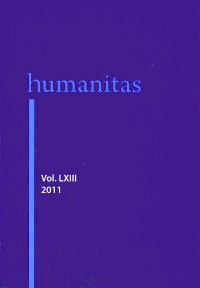Please use this identifier to cite or link to this item:
https://hdl.handle.net/10316.2/22999| DC Field | Value | Language |
|---|---|---|
| dc.contributor.author | Dias, Geraldo Coelho | - |
| dc.date.accessioned | 2013-04-22T14:32:01Z | |
| dc.date.accessioned | 2020-10-02T10:06:25Z | - |
| dc.date.available | 2013-04-22T14:32:01Z | |
| dc.date.available | 2020-10-02T10:06:25Z | - |
| dc.date.issued | 2011 | - |
| dc.identifier.issn | 2183-1718 | - |
| dc.identifier.uri | https://hdl.handle.net/10316.2/22999 | - |
| dc.description.abstract | A Biblioteca de Alexandria emblematiza a importância do grego, quando se tornou a língua culta da antiguidade. Por isso, até os judeus, sempre ciosos da superioridade da sua religião e da sua Bíblia, procuraram traduzir para o grego comum – KOINÉ – os seus livros sagrados. Foi esse o princípio das muitas traduções do texto bíblico sagrado, cuja importância literária e até teológica chegou até aos nossos dias e continua essencial para averiguarmos o percurso da Bíblia. Foi o livro apócrifo da “Carta de Aristeu”, século II AC, que nos transmitiu a lenda dos 72 sábios, isolados, a fazer cada um a respectiva tradução – Bíblia dos LXX - e como que a justificar a sua revelação para os que, na Diáspora, queriam instruir-se na Palavra do Deus bíblico. Filão de Alexandria narra como os judeus do Egipto veneravam esta tradução e agradeciam a Deus este benefício. | por |
| dc.description.abstract | The Library of Alexandria exemplifies the importance of the Greek language, after it became the language of culture in Antiquity. For that reason, even Jews, who keenly felt the superiority of their religion and their Bible, sought to translate their sacred books into KOINE Greek. Many other translations of biblical texts followed, the literary and theological importance of which has come down to the present day and remains essential for understanding how the Bible came about. The apocryphal “Letter of Aristaeus”, 2nd century AD, transmitted the legend of the 72 sages, translating the Septuagint in isolation, almost as a revelation for those who, in the Diaspora, wanted to learn the word of God. Philo of Alexandria describes how Egyptian Jews thanked God for this translation. | eng |
| dc.language.iso | por | - |
| dc.publisher | Faculdade de Letras da Universidade de Coimbra, Instituto de Estudos Clássicos | - |
| dc.subject | Bible | eng |
| dc.subject | Septuagint | eng |
| dc.subject | Letter of Aristaeus | eng |
| dc.subject | Philo of Alexandria | eng |
| dc.subject | Bíblia | por |
| dc.subject | Bíblia dos LXX | por |
| dc.subject | Carta de Aristeu | por |
| dc.subject | Filão de Alexandria | por |
| dc.title | Biblioteca de Alexandria: o Helenismo e a dinâmica cultural dos judeus | por |
| uc.publication.collection | Humanitas vol. LXIII | - |
| uc.publication.firstPage | 217 | - |
| uc.publication.lastPage | 223 | - |
| uc.publication.location | Coimbra | - |
| uc.publication.journalTitle | Humanitas | - |
| uc.publication.volume | 63 | por |
| dc.identifier.doi | 10.14195/2183-1718_63_12 | - |
| uc.publication.section | Artigos | - |
| uc.publication.orderno | 12 | - |
| uc.publication.area | Artes e Humanidades | - |
| uc.publication.manifest | https://dl.uc.pt/json/iiif/10316.2/22999/255148/manifest?manifest=/json/iiif/10316.2/22999/255148/manifest | - |
| uc.publication.thumbnail | https://dl.uc.pt/retrieve/11985974 | - |
| item.grantfulltext | open | - |
| item.fulltext | With Fulltext | - |
| Appears in Collections: | HVMANITAS | |
Files in This Item:
| File | Description | Size | Format | |
|---|---|---|---|---|
| humanitas63_artigo12.pdf | 336.93 kB | Adobe PDF |  |
Items in DSpace are protected by copyright, with all rights reserved, unless otherwise indicated.
